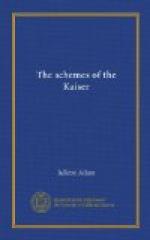September 12, 1892. [27]
William has given up the idea of his trip to Hamburg, cholera being the sort of jest for which he has no relish. To make up, he has rushed off to Canossa. The Black Alliance, as the Liberals call it, is an accomplished fact. The price paid to the Catholics for their assistance has been a matter of bargaining; what William II wants is an increase in the peace-footing of the army, and of the annual contingent of recruits, so that Germany’s army of 300,000 men may always be ready.
In twenty years the War budget has been raised from 309 to 700 millions, as the result of these new plans. The Freisinnige Zeitung wonders what will happen on the day when the opposition of the Catholic Centre shall cease, which has always been a check upon military expenditure and which, nevertheless, has not prevented Germany from spending 11,597 millions upon armaments since 1871.
Will Austria follow once more the lead of Berlin? The object of William II’s visit to Vienna, accompanied by Von Caprivi, is to decide her to do so. In the Empire of the Hapsburgs, as in Germany, people are asking; “What is going to be the end of all this expenditure?” The Vaterland, discussing William’s voyage, says that “the pact between the three great powers appears to be beginning to be very shaky.”
September 29, 1892. [28]
William II thinks that War is impending and close at hand; he feels that Italy is inclined to argue, and Austria to assert herself. According to the tradition of Von Moltke, he wishes to be ready at the hour of his own choosing.
In the last volume of the Field-Marshal’s memoirs, there is a letter addressed by him to the deputy, Count de Bethusy Huc, dated March 29, 1869, in which the following words occur—
“After a war like that which we have just ended, one can hardly wish for another. I desire, however, to profit by the occasion which now offers to make war on France, for, unfortunately, I consider this war to be absolutely necessary, and indispensable within a period of five years; after that, our organisation and armament, which are to-day superior, may be equalled by the efforts of France. It is therefore to our interest to fight as soon as possible. The present moment is favourable; let us profit by it.”
November 12, 1892. [29]
If you would take the measure of the hatred which the Emperor-King of Prussia, has towards Russia, read the Youth of William the Second by Mr. Bigelow, his companion in childhood, the friend of his youth, and the passionate admirer of his imperial greatness.
In the eyes of Mr. Bigelow, William II is endowed with all the virtues, all the qualities, and a hatred of evil; he is a complete master of every conceivable kind of science. He is a person of tact, foresight, and superior feelings, he possesses the noblest qualities of courage and sense of honour. He knows better than any one else everything concerning government, business, trade and industry. Of his military art, it were needless to speak; it is conspicuously evident. A brilliant talker and a fine orator, his lucidity of observation, his judgment, and his rapidity of decision are all alike, incomparable.




